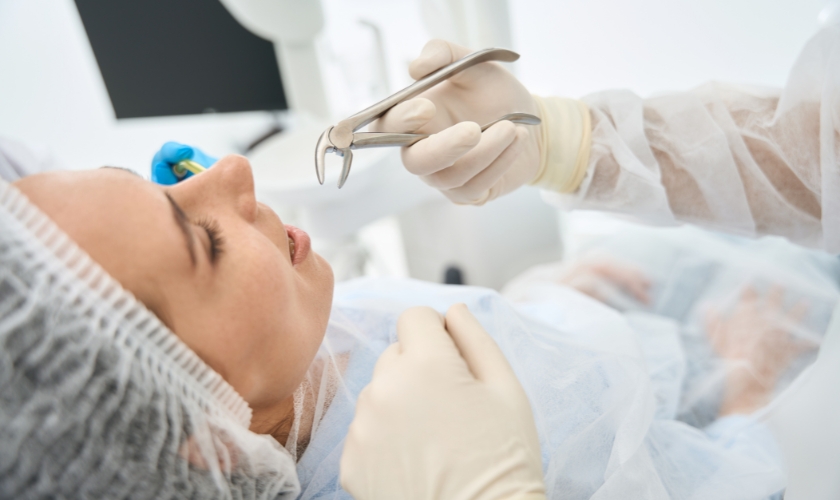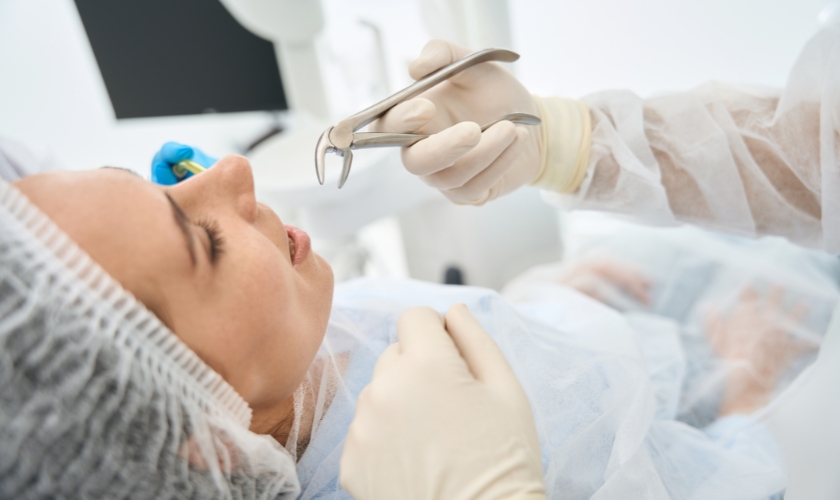Book An Appointment

Wisdom tooth extraction can be a daunting experience, but proper care and attention to aftercare can make the recovery process smoother and more comfortable. Knowing what to do and what to avoid is crucial for healing. Here’s a breakdown of the essential dos and don’ts to follow after wisdom tooth extraction:
Managing Pain and Swelling After Wisdom Tooth Extraction
Do:
- Take prescribed pain medication: Follow your dentist’s instructions for dosage and frequency.
- Apply ice packs: Use an ice pack wrapped in a towel on your cheek near the extraction site for 15-20 minutes at a time, several times a day. Reduce frequency as swelling subsides.
- Eat soft foods: Opt for soft, cool, or lukewarm foods like yogurt, applesauce, mashed potatoes, and soups.
Don’t:
- Smoke or use tobacco products: Smoking can impede healing and increase the risk of infection.
- Drink through a straw: The suction can dislodge the blood clot formed at the extraction site, delaying healing and potentially causing a painful dry socket.
- Consume hot or spicy foods: These can irritate the extraction site and worsen discomfort.
Maintaining Oral Hygiene
Do:
- Gently rinse your mouth with warm saltwater: Mix a half teaspoon of table salt in a glass of warm water and gently swish two to three times a day, especially after meals. This helps keep the area clean and prevent infection.
- Brush your teeth: Use a soft-bristled toothbrush and gentle brushing technique, avoiding the extraction site for the first few days. Gradually start brushing the area according to your dentist’s instructions.
- Follow your dentist’s instructions for mouth rinses: If your dentist recommends a specific mouthwash, use it as directed. Opt for alcohol-free rinses to avoid irritation.
Don’t:
- Brush or floss vigorously: This can irritate the extraction site and disrupt healing.
- Spit forcefully: Spit gently after rinsing or brushing to avoid dislodging the blood clot.
- Use mouthwash containing alcohol: Alcohol-based mouthwashes can dry out and irritate the wound.
Eating and Drinking
Do:
- Stay hydrated: Drink plenty of water throughout the day to prevent dehydration and promote healing.
- Consume cool or lukewarm liquids: Opt for cool or lukewarm beverages like water, milk, or clear broth to soothe the extraction site.
- Eat nutrient-rich soft foods: Choose soft foods rich in vitamins and minerals like yogurt, mashed potatoes, scrambled eggs, and fish.
Don’t:
- Drink carbonated beverages: Carbonated drinks can cause discomfort and bloating.
- Eat hard, crunchy, or sticky foods: These foods can lodge in the extraction site, irritate the wound, and increase the risk of infection.
- Consume alcohol or caffeine: Alcohol and caffeine can dehydrate you and hinder the healing process.
Monitoring Healing Progress
Do:
- Keep track of any unusual pain, swelling, or bleeding: While some discomfort is normal, persistent or worsening pain, excessive swelling, or prolonged bleeding could indicate complications. Report these to your dentist promptly.
- Follow up with your dentist for scheduled check-ups: Attend all follow-up appointments scheduled by your dentist to monitor healing and address any concerns.
- Take it easy and allow your body to rest and heal: Get plenty of rest in the first few days after surgery and avoid strenuous activities that can slow healing.
Don’t:
- Ignore signs of infection: Signs of infection include increased pain, swelling, redness around the extraction site, fever, or bad breath. If you experience any of these, contact your dentist immediately.
- Engage in vigorous physical activities: Strenuous exercise can raise your blood pressure and disrupt healing. Discuss appropriate activity levels with your dentist.
- Skip follow-up appointments: Skipping check-ups can delay diagnosis and treatment of potential complications.
Returning to Normal Activities After Tooth Extraction
Do:
- Gradually resume normal daily activities: As you feel comfortable, gradually resume your daily routine. Start with light activities and increase intensity as you heal.
- Maintain a balanced diet: Eat a balanced diet rich in fruits, vegetables, and protein to support healing and provide your body with the nutrients it needs to recover.
- Communicate any concerns or questions with your dentist: Don’t hesitate to reach out to your dentist if you have any questions or concerns about your recovery process.
Don’t:
Rush back into strenuous exercise: Avoid strenuous activities like heavy lifting or sports for at least a week after surgery. Let your body heal and regain strength before resuming such activities.
- Use tobacco products: Smoking or chewing tobacco can significantly delay healing and increase the risk of infection. Avoid tobacco use for at least a week after surgery, or ideally, quit altogether.
- Hesitate to seek professional help: If you experience any severe pain, persistent bleeding, difficulty swallowing, or fever, don’t hesitate to contact your general dentist in Charlotte NC or seek emergency medical attention if necessary.
Remember, proper aftercare is crucial for a smooth and successful recovery from wisdom tooth extraction. By following these dos and don’ts, you can minimize discomfort, promote healing, and get back to your normal routine as soon as possible. If you have any concerns or questions, don’t hesitate to consult your dentist for personalized guidance throughout your recovery journey.
FAQs
Recovery time varies depending on the complexity of the surgery and your individual healing process. Generally, expect some discomfort and swelling for the first few days, with significant improvement within a week. However, complete healing can take several weeks or even months.
If you experience severe pain or persistent swelling that doesn’t improve with medication, contact your dentist immediately. These could be signs of infection or other complications that require professional attention.





